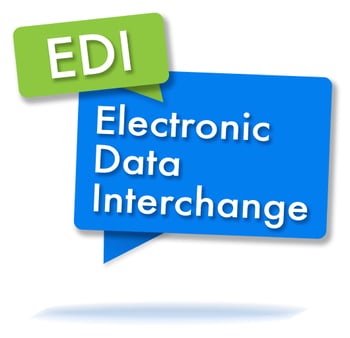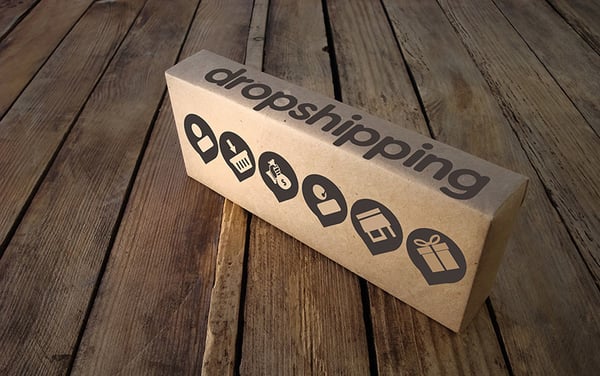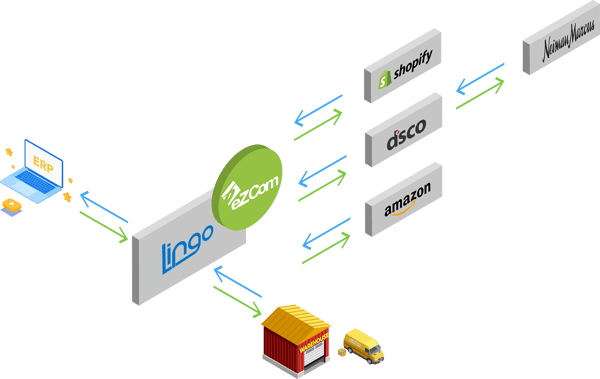Economic slowdowns create challenges for businesses of all sizes: supply chain bottlenecks, labor shortages, funding access issues, and higher capital costs. Combine that with increased focus on profitability vs. growth, and your business is in the crosshairs. So how can you survive and even thrive?
The Power of Your EDI Provider
Your EDI is a critical component of your business growth in the best of times. But in challenging times, having an EDI solution that can free up staff from manual order pushing, and streamline various systems that retailers make you use, is invaluable.
With a robust EDI platform, you can replace time-consuming, expensive, error-prone manual entry processes with seamless automation. Finding an EDI partner that gives you access to a full-service environment that supports your business daily with seasoned technology advisors puts you at a solid competitive advantage.
First, we'll identify the hidden costs in your supply chain that a robust EDI software helps you address. Then we'll evaluate what makes a powerful EDI solution tick and how you can select a worthy provider.
The first place to look for cost savings in your supply chain is often with your vendors. But looking inward at your organization can also reveal inefficiencies that are ripe for improvement.

Slow Order Processing
Supply chains have many moving parts, and the entire system is affected when any of those parts are slow. Manual data entry, cut and pasting processes, and a lack of system integrations all contribute to this. Retailers demand rapid order turnaround times to keep ahead of the competition. If you're not meeting their expectations, they may look elsewhere for a vendor that can. Slow order processing puts downward pressure on your margins and hurts your ability to reinvest in your business.
Inventory turnover is a crucial area to focus on. When inventory is low, you're not stocking enough popular items to keep up with demand, which leads to lost sales. Likewise, having too much inventory of slow-moving items can tie up working capital that could be better used elsewhere.
A good EDI solution helps you monitor inventory turnover and enables you to conduct reporting vital to Just-in-Time inventory management. EDI automation also reduces the need for manual work, allowing you to do more with less. Reducing manual data entry saves you money in two ways:
- It minimizes the costs associated with manual data entry errors. The average error rate for manual entry is around 1%, meaning if you're processing 1000 orders per month, you can expect 10 of those to have errors.
- Staffing up to manage manual entry is an expensive proposition. With labor harder to find and retain, manual labor may be an unaffordable solution. Labor costs are rising, productivity is down, and the pool of available workers is shrinking.
Chargebacks
One way that retailers put pressure on their vendors is through chargebacks. A chargeback occurs when a retailer's unique expectations have not been met, and they charge the vendor. Common examples include orders that miss delivery windows, are mislabeled, or contain different products or expected quantities.
Some retailers even see chargebacks as an additional revenue stream and are waiting for vendors to mess up. They will assess chargebacks for every mistake, and it's up to you to prove the goods shipped correctly. For example, if a shipment is mislabeled, the store applies a chargeback for the time it takes them to manually check the inventory and enter it into their system. A robust EDI solution helps minimize the chance of chargebacks by ensuring the GS1-128 label is formatted to the retailer’s specifications, and the information on the label matches what is on the ASN (Advanced Shipment Notice).
Some of the most common chargebacks assessed include:
- Invoice errors: If invoices are incorrect, they may cause delays in payments or overcharging. Retailers may charge vendors if they receive a duplicate invoice or the totals are incorrect.
- ASN mistakes: If you don't include all the information required in the Advanced Shipping Notifications (ASN) or if the information is inaccurate, the retailer may file a chargeback. If this information is incorrect, it affects the retailer's ability to plan for goods receivable, labor, and shelf space.
- Late (or early) delivery: Many retailers run on a just-in-time delivery model. If you don't meet the delivery date specified in the contract, the retailer can't plan accordingly. A chargeback may be issued to cover costs if you miss the Must Arrive By Date (MABD).
Service Costs of Vendor Relationships
The business relationships you have with retailers can have a significant impact on your business. Your trading partners are under evolving demands of shoppers who want what they want and as fast as possible. To keep impatient consumers happy, retailers are looking to partner with vendors they can rely on—who will meet promises and deliver as expected. Many retailers maintain scorecards on vendors that they refer to when placing orders. Maintaining good relationships means ongoing business for you.
Your EDI solution should let you streamline orders and automate processes, greatly reducing errors in shipping and keeping your retailers–and their customers–happy. Here are some of the ways a good EDI solution can help with retailer relations and save you money:
- Quicker communication: EDI systems can automate many tasks that take up your team's time. This includes sending and receiving purchase orders, invoices, and other documents. Documents are sent and received immediately, and the EDI software translates them into a format both systems can read.
- Better supply chain visibility: A good EDI system will provide visibility into every step of the supply chain. Retailers are able to see when an order has been shipped, when it will be delivered, and if there are any issues along the way. This helps to avoid delays and disruptions.
- Automated data input: Data entry is one of the most time-consuming tasks for any business. EDI systems can automate this task by automatically inputting data into your systems. Employees don't need to manually fill out invoices or move customer data between systems.
- Faster deliveries: Automation eliminates high-touch, time-sensitive manual order processing.
EDI software helps you manage these costs by automating order processing and providing accurate information, which allows you to avoid errors that can lead to returns, disputes, and late shipments.
Not only do retailers keep scorecards on their vendors, but they are also aware of the companies that provide EDI. If you partner with someone with a bad reputation, it will reflect poorly on your company, and retailers may choose to do business elsewhere. Selecting an EDI provider with a good reputation is critical.
When you start shopping around, you should keep a few must-haves in mind.
Technology
When looking for an EDI provider, it is crucial to find one that can offer the following features and benefits:
- Full-service translation and communication: You need a system that can automatically translate global formats, such as XML, EDIFACT, and X12.
- Process bulk orders: EDI software should be able to handle large-scale orders quickly and efficiently. Bulk order processing is especially important when dealing with big retailers who place large orders.
- Customization: EDI may be a standardized language, but each retailer and vendor workflow is unique. An EDI solution needs to be customizable to meet the specific needs of every business it's connected to.
- Reporting: The system should provide accurate and up-to-date reporting to track your inventory levels, shipments, and invoices.
- Manage updates: Retailers sometimes change their trading partner maps, which may require updates to your EDI software. If a retailer changes its ASN, hundreds of things can go wrong. Your EDI provider should be able to handle these changes on your behalf.
- Integration: Your EDI software should allow you to integrate with your internal operations and systems. Instead of switching between programs and manually transferring data, EDI can handle this from one location.
- Expertise and support: Access to EDI experts during onboarding and for the lifetime of the partnership is crucial. They should be able to offer support and advice on how to overcome any challenges you face.
- GS1-128 labels: The system should generate GS1-128 labels efficiently, without errors, and to each retailers' unique requirements
- Retailer branded packing slips: Your retailers may have specific requests for packing slips that match their brand style and guidelines. An EDI solution should be flexible enough to accommodate these requests.
Your EDI solution should make your processes more straightforward, not add to your workload. And it should satisfy all key stakeholder needs, including reliability, data security, and compliance. If your provider can't deliver on these core requirements, then retailers will likely have an issue working with you.
When choosing an EDI provider, you should consider how the system integrates with your existing software. Integration helps to automate tasks that would otherwise require manual data entry.
EDI integrations may include the following:
- ERP
Your EDI platform should integrate with your existing enterprise resource planning (ERP) software, such as Netsuite, SAP BUsiness One, or Acumatica. ERP Integration allows you to manage your inventory, customers, suppliers, and orders from one platform. - Accounting
Your financial business systems should integrate with your EDI platform instead of manually transferring data. Accounting Integration will save you time and reduce error risk. For example, if you use QuickBooks, a seamless connection via a good EDI platform allows you to keep your inventory up-to-date and your accounting under control. - Online Orders
Your EDI solution should be able to integrate with online storefronts and major online marketplaces, such as Amazon Seller, Shopify, and Faire. - Warehouse and 3PLs
Integration with your warehouse and Third-Party Logistics Providers (3PLs) will allow you to automatically share information such as inventory levels and tracking numbers.
If you're not complying with retailer requirements, you open yourself to chargebacks and poor retailer relationships. An EDI provider will help you stay compliant with your trading partners' needs.
For example, if a retailer sets out specific instructions for GSI labels, your EDI solution should be able to generate these labels to spec. If labels don't meet the requirements, the retailer will be able to raise a chargeback.
Mistakes are not tolerated. If you're working with multiple retailers who all want retailer-branded, fully-compliant packing slips and shipping labels, you'll need an EDI solution that can handle that complexity well.
Your EDI solution should go above and beyond to prevent chargebacks through safeguards like double-validation checks, meaning when a document is transmitted, like ASNs or invoices, the software will check that all the required data is there before sending it to your trading partners. If any information is missing, the system will alert you so that you can fix the issue before it causes a penalty.
Customer Experience
Your EDI software should be painless to learn and use, making running your business easier, not adding frustration. A robust EDI platform will be mobile-friendly, enabling remote access to troubleshoot problems on the go.
Any business using an EDI provider needs to be able to reach a real person when issues arise. Waiting hours or days for a response can lead to late deliveries, disgruntled customers, and even lost retailer relationships. Therefore, your EDI provider should have responsive customer support without the need to upgrade your package.
EDI software should be customizable to your business needs, not just an out-of-the-box solution. Your workflows are unique, and your EDI software should reflect this. Each time you sign with a new trading partner, you'll also want to be able to add them quickly to your workflows. Settings should be adjustable to suit the specifics of all new relationships.
Your EDI provider must offer training and support to help you get the most out of your system. They should also have a team of experts who are available to answer any questions you may have. Better yet, they should provide you with a dedicated EDI expert who will be responsible for getting you set up, and who will remain your primary point of contact.
A winning EDI provider should be able to provide the following:
- Comprehensive Training
- Live phone support
- Quick response to feature requests and updates (i.e., adding trading partners)
- Intuitive software interface
When considering an EDI provider, ask about their customer service and support. Find out their available hours and how quickly they respond to inquiries. Check their online reviews and ask to talk with their existing customers to learn from customers’ experiences with them.
Order Processing
Order processing should be as efficient as possible. An EDI platform should be able to automatically generate different documents such as ASNs, order acknowledgements, warehouse shipments and invoices. The documents will be sent to the right destination with little need for human intervention.
The system should have features that allow you to:
- Manage multiple orders at once
- Organize orders by client, product, or other criteria
- View the status of all your orders in one place
- Search for specific orders
- Generate reports on order history
- Improve inventory turnover by alerting the user when inventory levels are being depleted
- Increase receivable speed by eliminating errors and sending invoices in a timely manner
Automated order processing should quickly lead to a decrease in errors and an increase in efficiency. Tags can be used to help users easily identify where in the fulfillment process every order is.

Drop Ship Processes
Drop shipping has become a popular business model recently, experiencing a significant push following the COVID-19 pandemic. If handled manually, drop shipping is open to errors and can be very time-consuming. Automating the process through EDI can save you a lot of headaches.
Drop ship automation makes it easier to sell your products on multiple channels without worrying about inventory management. An EDI solution should be able to receive orders from all your sales channels and automatically print the shipping labels and send the relevant data to your shipping partners like FedEx or UPS.
Some EDI features that benefit drop shipping are:
- Streamlining the exchange of data from multiple sales channels
- Allowing quick and easy scaling as your business grows
- Greater accessibility with 24/7 uptime allowing you to accept orders even when not actively working
With retailers increasingly drop shipping, the need for an EDI platform to produce branded packing slips for their customers has become standard. If a retailer places an order being drop shipped, they need their company's name on the packing slip, not the supplier's. Your EDI software should be able to handle this for all your retailers.
Not all EDI providers are created equal. When you're looking for a provider, find one that offers the features and services that are most important to you. It's a partnership, not a transaction. It's essential to use a service that will invest in your success; they should have the knowledge to bridge the gap in your business processes.
Not Every EDI Solution Fits All
An EDI solution should be able to integrate with your unique systems and automate as many processes as possible. This is essential to the success of your business. Your EDI needs to connect with your eCommerce platforms, accounting software, and marketplaces to streamline operations and strengthen your procedures.
Some questions to ask an EDI provider before signing on include:
- How long has the company been in business?
- What industries do they specialize in?
- Do they have a team of experts who can answer questions?
- Can you process all your orders—EDI and eCommerce—the same way?
- Can you customize as needed to your business systems?
- What is their migration process?
- What kind of training and support do they offer?
Whether you have a small business or enterprise operation, the EDI provider you choose must have the right features to support your needs.
Customer Service Strength (ongoing, accessible, expert care)
Customer service is crucial. When things go wrong, you need to know that there's someone you can reach out to for help. For example, imagine you need to make a last-minute change to the ASN, but the labels have already been printed. You need someone to quickly help, so your shipment isn't delayed or rejected. This isn't an issue that can wait hours or days for a response. Being able to contact someone immediately is essential.
Getting started with an EDI platform can be stressful for any business. There are many moving parts, and it's essential to have someone you can rely on for support. And selecting a supportive EDI provider experienced with retailers and your specific industry is also helpful as they will already be familiar with the retailer requirements.
Experts/Specialists
Any EDI partner you choose should be the real deal—seasoned specialists with years of experience from various clients and industries. This allows them the ability to recognize potential problems before they happen and offer creative solutions to complex challenges.
iPaaS vs True EDI Consultants
In today's market, many EDI providers are offering Integration Platform-as-a-Service (iPaaS). EDI best practice is to connect and integrate your business systems to the cloud, and IaaS is an economical way to do that. However, be aware that it costs money for ongoing support, and you'll need to hire in-house experts to manage things on your end.
A good EDI provider already has the experts on hand to help you with integration and can offer competitive pricing. They will also have a team of developers who are familiar with your business systems and can customize the integration and connections.
A great provider will also have a team of experts in your vertical and will be familiar with your retailers. These experts can help you set up your system, train your team, and provide ongoing support. They will also be able to offer best practices and tips to help you optimize your system and improve your business processes.
For example, if you're in the medical industry, a terrific EDI provider for you will be familiar with HIPAA. Or, in the automotive industry, an exceptional EDI provider for you will be aware that there are rules on the data that must be exchanged between manufacturers and dealers.
Experienced and insightful EDI consultants are powerful. If your EDI provider lacks familiarity with the standards you need to meet, they may not set your system up correctly.
Conclusion
To grow and weather slowdowns, you must look at every opportunity to increase sales velocity and reduce costs. Improving your EDI processes can be daunting and may not be a top "to do" because of the complexity involved, but it will help you address many costs.
And the right EDI provider should make this all easy for you. Don't be fooled; despite being a standardized data format, not all EDI software is the same. You need to partner with someone who can configure the software to your needs and integrate with your business systems. All you should need to do is log into your account and get working, saving you time and energy so that you can focus on growing your business. A good provider offers comprehensive solutions, not just software.
Who is eZCom?
For suppliers (brands), who want to grow their business, eZCom Lingo is a full-service EDI solution that helps brands process retail orders quickly through all fulfillment channels, and comply with retailers’ requirements. Unlike competitors, eZCom is the only EDI specialist to provide a solution adapted to customers’ unique needs, together with ongoing expert care for the life of the EDI implementation.


